1
In a higher phase of communist society, after the enslaving subordination of the individual to the division of labor, and therewith also the antithesis between mental and physical labor, has vanished; after labor has become not only a means of life but life's prime want; after the productive forces have also increased with the all-around development of the individual, and all the springs of co-operative wealth flow more abundantly–only then can the narrow horizon of bourgeois right be crossed in its entirety and society inscribe on its banners: From each according to his ability, to each according to his needs! .Karl Marx

2
Go on, get out! Last words are for fools who haven't said enough!Karl Marx
3
..[G]reat progress was evident in the last Congress of the American 'Labour Union' in that among other things, it treated working women with complete equality. While in this respect the English, and still more the gallant French, are burdened with a spirit of narrow-mindedness. Anybody who knows anything of history knows that great social changes are impossible without the feminine ferment. Social progress can be measured exactly by the social position of the fair sex (the ugly ones included). .Karl Marx
4
Modern bourgeois society with its relations of production, of exchange, and of property, a society that has conjured up such gigantic means of production and of exchange, is like the sorcerer, who is no longer able to control the powers of the nether world whom he has called up by his spells.Karl Marx
5
The ideas of the ruling class are in every epoch the ruling ideas, i.e. the class which is the ruling material force of society, is at the same time its ruling intellectual force. The class which has the means of material production at its disposal, has control at the same time over the means of mental production, so that thereby, generally speaking, the ideas of those who lack the means of mental production are subject to it. The ruling ideas are nothing more than the ideal expression of the dominant material relationships, the dominant material relationships grasped as ideas. .Karl Marx
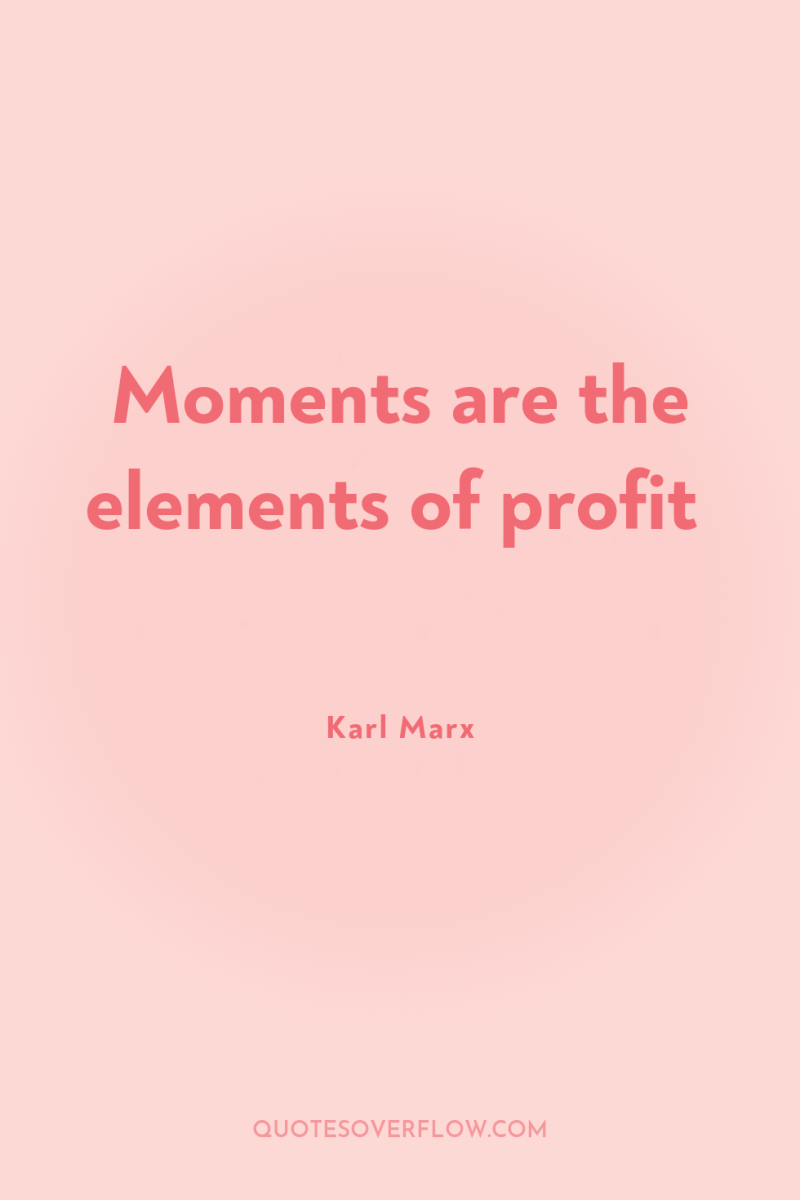
6
Moments are the elements of profitKarl Marx
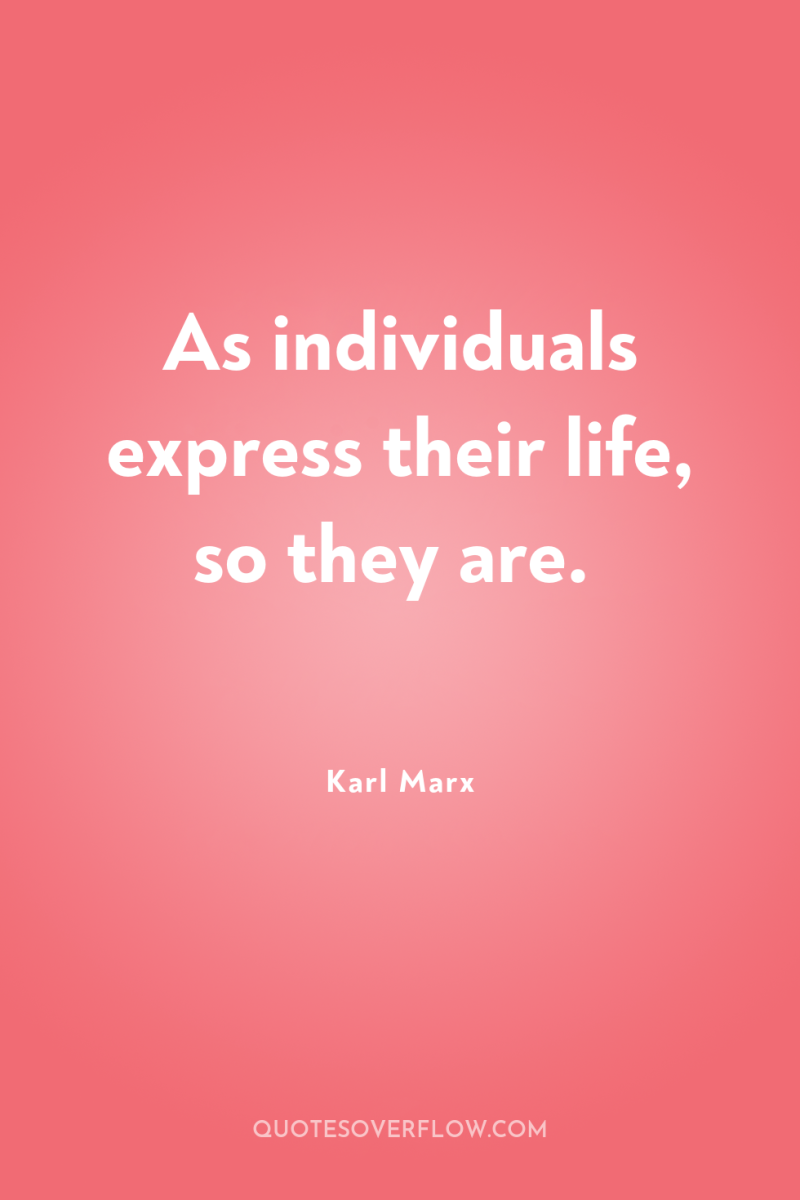
7
As individuals express their life, so they are.Karl Marx
8
The foundation of irreligious criticism is: Man makes religion, religion does not make man. Religion is, indeed, the self-consciousness and self-esteem of man who has either not yet won through to himself, or has already lost himself again. But man is no abstract being squatting outside the world. Man is the world of man — state, society. This state and this society produce religion, which is an inverted consciousness of the world, because they are an inverted world.. Religious suffering is, at one and the same time, the expression of real suffering and a protest against real suffering. Religion is the sigh of the oppressed creature, the heart of a heartless world, and the soul of soulless conditions. It is the opium of the people. The abolition of religion as the illusory happiness of the people is the demand for their real happiness. To call on them to give up their illusions about their condition is to call on them to give up a condition that requires illusions. The criticism of religion is, therefore, in embryo, the criticism of that vale of tears of which religion is the halo. Criticism has plucked the imaginary flowers on the chain not in order that man shall continue to bear that chain without fantasy or consolation, but so that he shall throw off the chain and pluck the living flower. The criticism of religion disillusions man, so that he will think, act, and fashion his reality like a man who has discarded his illusions and regained his senses, so that he will move around himself as his own true Sun. Religion is only the illusory Sun which revolves around man as long as he does not revolve around himself.Karl Marx
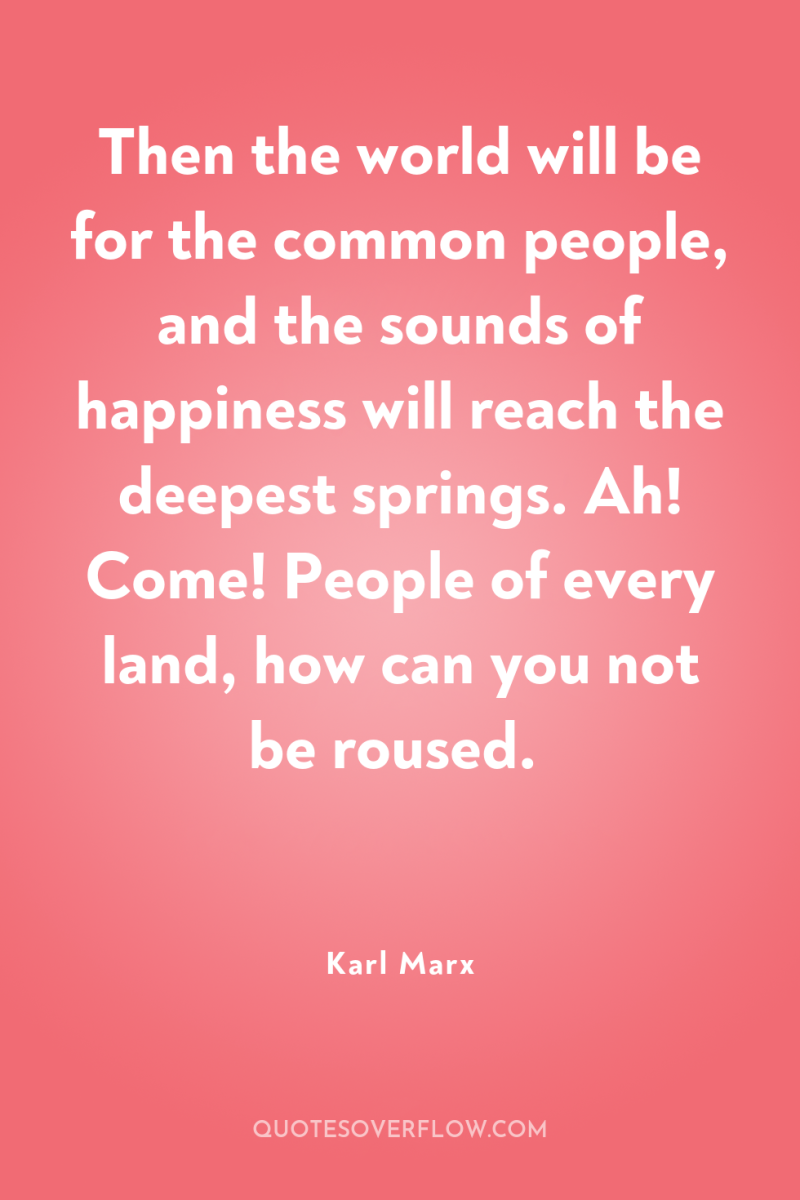
9
Then the world will be for the common people, and the sounds of happiness will reach the deepest springs. Ah! Come! People of every land, how can you not be roused.Karl Marx
10
Christ represents originally: 1) men before God; 2) God for men; 3) men to man. Similarly, money represents originally, in accordance with the idea of money: 1) private property for private property; 2) society for private property; 3) private property for society. But Christ is alienated God and alienated man. God has value only insofar as he represents Christ, and man has value only insofar as he represents Christ. It is the same with money.Karl Marx
11
Criticism has plucked the imaginary flowers on the chain not in order that man shall continue to bear that chain without fantasy or consolation, but so that he shall throw off the chain and pluck the living flower.Karl Marx

12
The education of all children, from the moment that they can get along without a mother's care, shall be in state institutions.Karl Marx
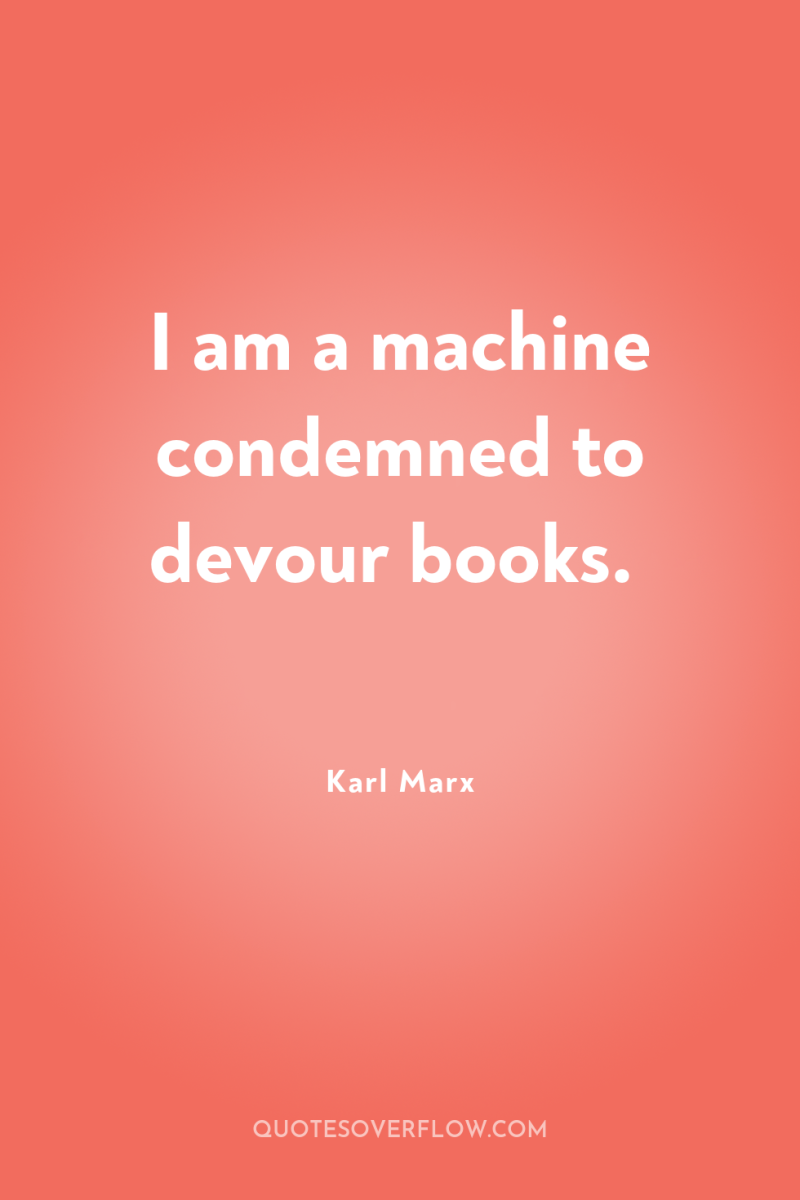
13
I am a machine condemned to devour books.Karl Marx
14
Defining by a general law the expenditures on the...school....is a very different thing from appointing the state as educator of the people. Government and church should rather be equally excluded from any influence on the school.Karl Marx

15
There is no royal road to science, and only those who do not dread the fatiguing climb of its steep paths have a chance of gaining its luminous summits.Karl Marx
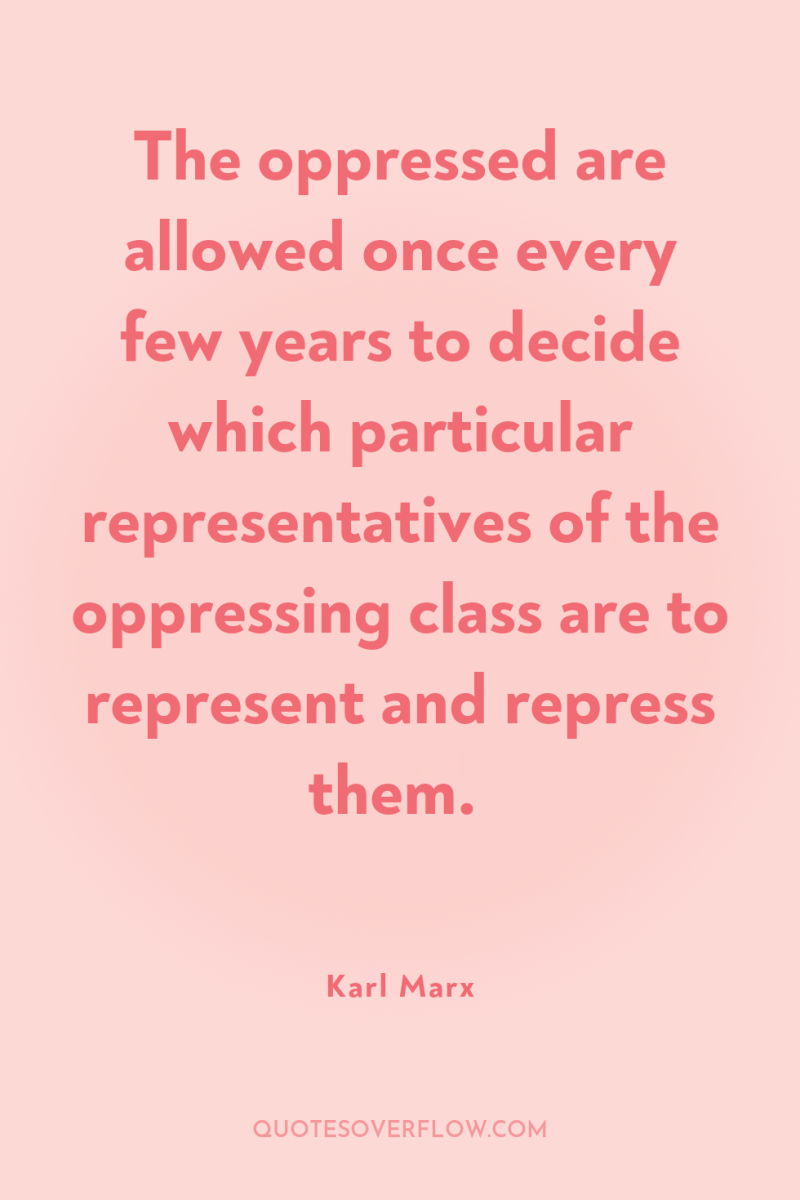
16
The oppressed are allowed once every few years to decide which particular representatives of the oppressing class are to represent and repress them.Karl Marx
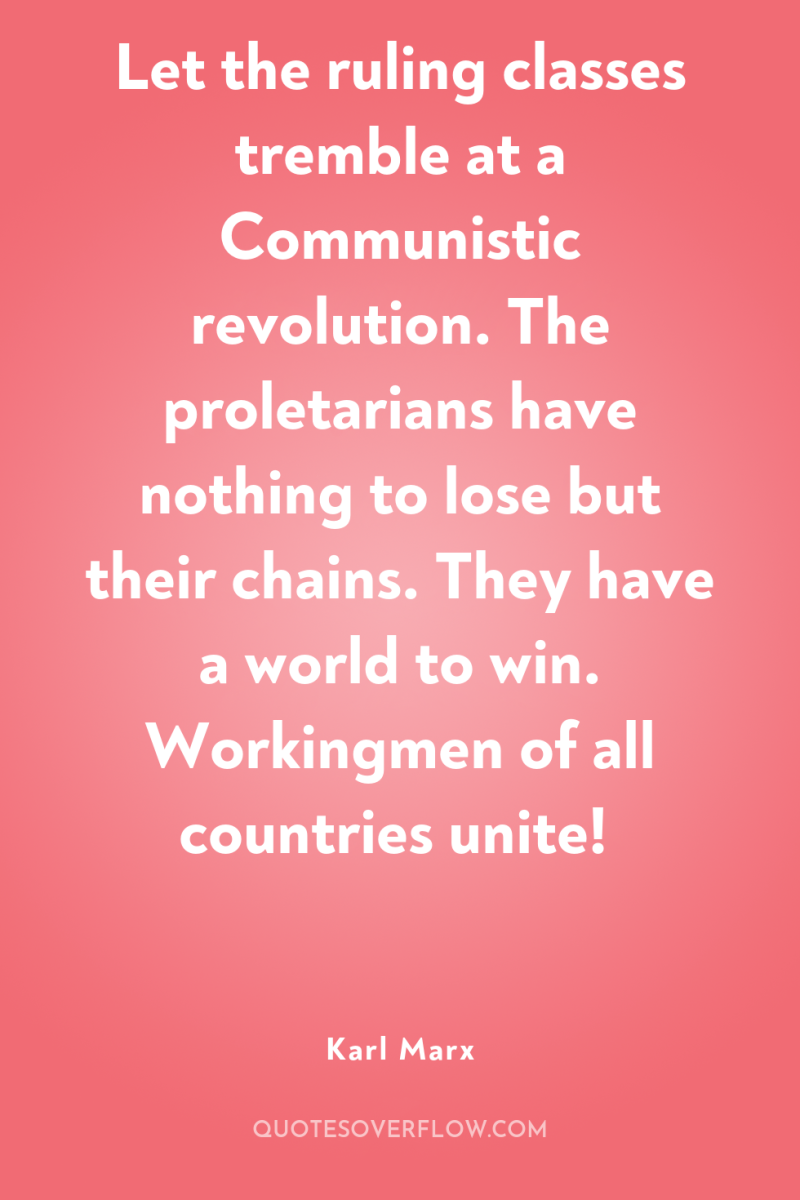
17
Let the ruling classes tremble at a Communistic revolution. The proletarians have nothing to lose but their chains. They have a world to win. Workingmen of all countries unite!Karl Marx
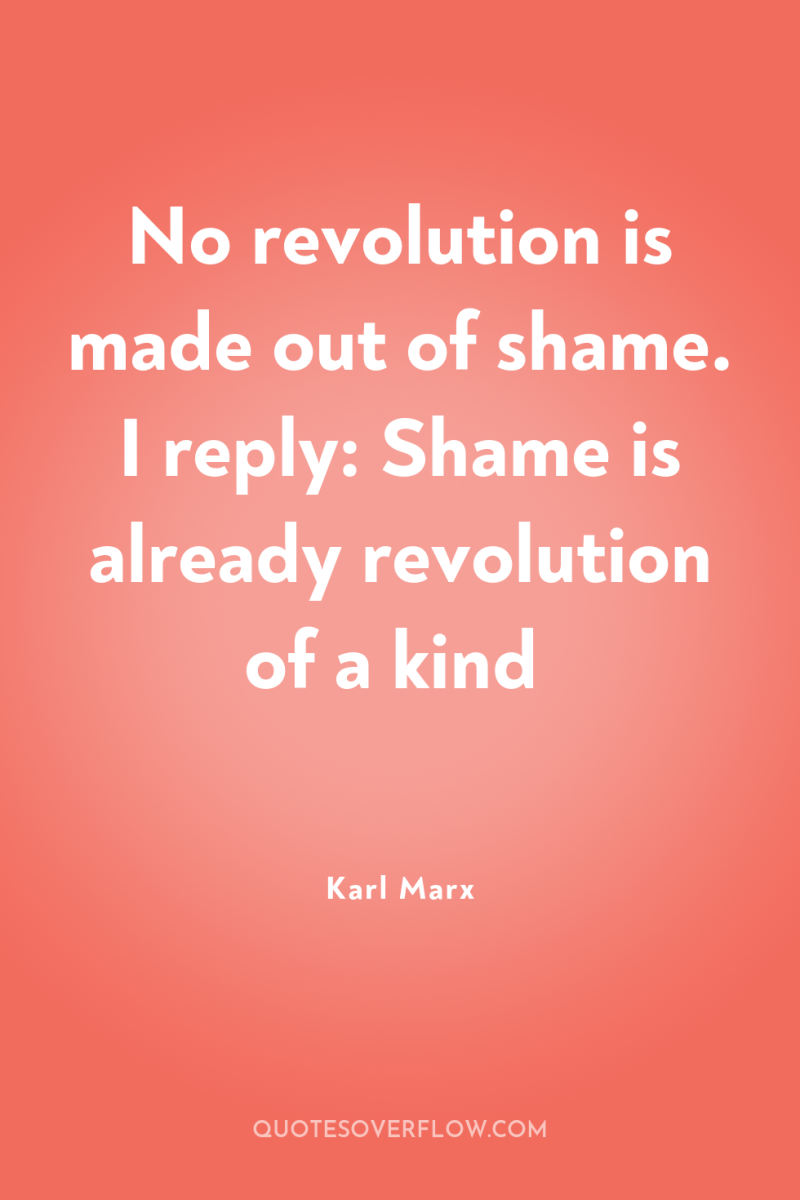
18
No revolution is made out of shame. I reply: Shame is already revolution of a kindKarl Marx
19
The bourgeois sees in his wife a mere instrument of production. He hears that the instruments of production are to be exploited in common, and, naturally, can come to no other conclusion than that the lot of being common to all will likewise fall to the women. He has not even a suspicion that the real point is to do away with the status of women as mere instruments of production. For the rest, nothing is more ridiculous than the virtuous indignation of our bourgeois at the community of women which, they pretend, is to be openly and officially established by the Communists. The Communists have no need to introduce the community of women; it has existed almost from time immemorial. Our bourgeois, not content with having the wives and daughters of their proletarians at their disposal, not to speak of common prostitutes, take the greatest pleasure in seducing each other's wives. Bourgeois marriage is in reality a system of wives in common and thus, at the most, what the Communists might possibly be reproached with, is that they desire to introduce, in substitution for a hypocritically concealed, an openly legalised community of women. For the rest, it is self-evident that the abolition of the present system of production must bring with it the abolition of the community of women springing from that system, i.e., of prostitution both public and private.Karl Marx
20
Everyone who knows anything of history also knows that great social revolutions are impossible without the feminine ferment. Social progress may be measured precisely by the social position of the fair sex (plain ones included).Karl Marx
21
The history of all hitherto existing society is the history of class struggles. Freeman and slave, patrician and plebeian, lord and serf, guildmaster and journeyman, in a word, oppressor and oppressed, stood in constant opposition to one another, carried on an uninterrupted, now hidden, now open fight, that each time ended, either in the revolutionary reconstitution of society at large, or in the common ruin of the contending classes.Karl Marx
22
Communism is the riddle of history solved, and it knows itself to be this solution.Karl Marx
23
Thus the aristocracy took their revenge by singing lampoons on their new master, and whispering in his ears sinister prophecies of coming catastrophe. In this way arose feudal Socialism; half lamentation, half lampoon; half echo of the past, half menace of the future, at times by its bitter, witty and incisive criticism, striking the bourgeoisie to the very heart's core, but always ludicrous in its effects, through total incapacity to comprehend the march of modern history.Karl Marx
24
It is well known how the monks wrote silly lives of Catholic Saints over the manuscripts on which the classical works of ancient heathendom had been written.Karl Marx
25
Men make their own history, but they do not make it as they please.Karl Marx
26
Men [sic] make their own history, but they do not make it as they please; they do not make it under self-selected circumstances, but under circumstances existing already, given and transmitted from the past.( Marx, 1963)Karl Marx
27
The bourgeois during its rule of scarce one hundred years, has created more massive and more colossal productive forces than have all preceding generations together.Karl Marx
28
History is not like some individual person, which uses men to achieve its ends. History is nothing but the actions of men in pursuit of their ends.Karl Marx
29
Communism deprives no man of the power to appropriate the products of society: all that it does is to deprive him of the power to subjugate the labor of others by means of such appropriation. It has been objected, that upon the abolition of private property all work will cease, and universal laziness will overtake us. According to this, bourgeois society ought long ago to have gone to the dogs through sheer idleness; for those of its members who work, acquire nothing, and those who acquire anything, do not work.Karl Marx
30
In proportion therefore, as the repulsiveness of the work increases, the wage decreases.Karl Marx
31
Capital is dead labour, which, vampire-like, lives only by sucking living labour, and lives the more, the more labour it sucks.Karl Marx
32
A spider conducts operations that resemble those of a weaver, and a bee puts to shame many an architect in the construction of her cells. But what distinguishes the worst architect from the best of bees is this, that the architect raises his structure in imagination before he erects it in reality.Karl Marx
33
A specter is haunting Europe–the specter of Communism. All the powers of old Europe have entered into a holy alliance to exorcise this specter; Pope and Czar, Metternich and Guizot, French radicals and German police spies. Where is the party in opposition that has not been decried as Communistic by its opponents in power? Where the opposition that has not hurled back the branding reproach of Communism, against the more advanced opposition parties, as well as against its reactionary adversaries? Two things result from this fact. I. Communism is already acknowledged by all European powers to be in itself a power. I I. It is high time that Communists should openly, in the face of the whole world, publish their views, their aims, their tendencies, and meet this nursery tale of the Specter of Communism with a Manifesto of the party itself. .Karl Marx
34
The bourgeois sees in his wife a mere instrument of production.Karl Marx
35
And here it becomes evident that the bourgeoisie is unfit any longer to be the ruling class in society and to impose its conditions of existence upon society as an over-riding law. It is unfit to rule because it is incompetent to assure an existence to its slave within his slavery, because it cannot help letting him sink into such a state that it has to feed him instead of being fed by him. Society can no longer live under this bourgeoisie; in other words, its existence is no longer compatible with society. The essential condition for the existence, and for the sway of the bourgeois class, is the formation and augmentation of capital; the condition for capital is wage-labor. Wage-labor rests exclusively on competition between the laborers. The advance of industry, whose involuntary promoter is the bourgeoisie, replaces the isolation of the laborers, due to competition, by their revolutionary combination, due to association. The development of modern industry, therefore, cuts from under its feet the very foundation on which the bourgeoisie produces and appropriates products. What the bourgeoisie therefore produces, above all, are its own grave diggers. Its fall and the victory of the proletariat are equally inevitable.Karl Marx
36
Society does not consist of individuals, but expresses the sum of interrelations, the relations within which these individuals stand.Karl Marx
37
Society as a whole is more and more splitting up into two great hostile campsKarl Marx
38
[representative government is] deciding once in three or six years which member of the ruling class was to misrepresent the people in Parliament,Karl Marx
39
Or how does it happen that trade, which after all is nothing more than the exchange of products of various individuals and countries, rules the whole world through the relation of supply and demand–a relation which, as an English economist says, hovers over the earth like the fate of the ancients, and with invisible hand allots fortune and misfortune to men, sets up empires and overthrows empires, causes nations to rise and to disappear–while with the abolition of the basis of private property, with the communistic regulation of production (and implicit in this, the destruction of the alien relation between men and what they themselves produce), the power of the relation of supply and demand is dissolved into nothing, and men get exchange, production, the mode of their mutual relation, under their own control again? .Karl Marx
40
The mystery of this courage of Bauer’s is Hegel’s Phenomenology. As Hegel here puts self-consciousness in the place of man, the most varied human reality appears only as a definite form, as a determination of self-consciousness. But a mere determination of self-consciousness is a “pure category, ” a mere “thought” which I can consequently also abolish in “pure” thought and overcome through pure thought. In Hegel’s Phenomenology the material, perceptible, objective bases of the various estranged forms of human self-consciousness are left as they are. Thus the whole destructive work results in the most conservative philosophy because it thinks it has overcome the objective world, the sensuously real world, by merely transforming it into a “thing of thought” a mere determination of self-consciousness and can therefore dissolve its opponent, which has become ethereal, in the “ether of pure thought.” Phenomenology is therefore quite logical when in the end it replaces human reality by “Absolute Knowledge”–Knowledge, because this is the only mode of existence of self-consciousness, because self-consciousness is considered as the only mode of existence of man; absolute knowledge for the very reason that self-consciousness knows itself alone and is no more disturbed by any objective world. Hegel makes man the man of self-consciousness instead of making self-consciousness the self-consciousness of man, of real man, man living in a real objective world and determined by that world. He stands the world on its head and can therefore dissolve in the head all the limitations which naturally remain in existence for evil sensuousness, for real man. Besides, everything which betrays the limitations of general self-consciousness–all sensuousness, reality, individuality of men and of their world–necessarily rates for him as a limit. The whole of Phenomenology is intended to prove that self-consciousness is the only reality and all reality.Karl Marx
41
Language is as old as consciousness, language is practical, real consciousness that exists for other men as well, and only therefore does it also exist for me; language, like consciousness, only arises from the need, the necessity, of intercourse with other men.Karl Marx
42
One basis for life and another basis for science is a priori a lie.Karl Marx
43
Ignorance never yet helped anybody.Karl Marx
44
He freed man from outer religiosity because he made religiosity the inner man. He freed the body from chains because he enchained the heart.Karl Marx
45
What exclusively determines the magnitude of the value of any article is therefore the amount of labour socially necessary, or the labour-time socially necessary for its production.Karl Marx
46
As exchange-values, all commodities are merely definite quantities of congealed labour-time.Karl Marx
47
A use-value, or useful article, therefore, has value only because abstract human labour is objectified or materialized in it. How, then, is the magnitude of value to be measured? By means of the quantity of the "value-forming substance", the labour, contained in the article. This quantity is measured by its duration, and the labour-time is itself measured on the particular scale of hours, days etc.Karl Marx
48
A use-value, or useful article, therefore, has value only because abstract human labour is objectified or materialized in it. How, then, is the magnitude of this value to be measured? By means of the quantity of the "value-forming substance", the labour, contained in the article. This quantity is measured by its duration, and the labour-time is itself measured on the particular scale of hours, days etc.Karl Marx
49
The increase in value of the world of things is directly proportional to the decrease in value of the human world.Karl Marx
50
Economists have a singular method of procedure. There are only two kinds of institutions for them, artificial and natural. The institutions of feudalism are artificial institutions, those of the bourgeoisie are natural institutions. In this, they resemble the theologians, who likewise establish two kinds of religion. Every religion which is not theirs is an invention of men, while their own is an emanation from God. When the economists say the present-day relations--the relations of bourgeois production--are natural, they imply that these are the relations in which wealth is created and productive forces developed in conformity with the laws of nature. These relations therefore are themselves natural laws independent of the influence of time. They are eternal laws which must always govern society. Thus, there has been history, but there is no longer any. There has been history, since there were institutions of feudalism, and in these institutions of feudalism we find quite different relations of production from those of bourgeois society, which the economists try to pass off as natural and, as such, eternal. .Karl Marx
51
The 'free' laborer, thanks to the development of capitalistic production, agrees, i.e. is compelled by social conditions, to sell the whole of his active life, his birthright for a mass of pottage.Karl Marx
52
Only in community with others has each individual the means of cultivating his gifts in all directions; only in the community, therefore, is personal freedom possible.Karl Marx
53
Everyone should be able to attend to his religious as well as his bodily needs without the police sticking their nose in.Karl Marx
54
Man is the highest essence of man, hence with the categorical imperative to overthrow all relations in which man is a debased, enslaved, abandoned, despicable essence.Karl Marx
55
Labor in the white skin can never free itself as long as labor in the black skin is branded.Karl Marx
56
The production of too many useful things results in too many useless people.Karl Marx
57
The bourgeoisie, by the rapid improvement of all instruments of production, by the immensely facilitated means of communication, draws all, even the most barbarian, nations into civilization. The cheap prices of its commodities are the heavy artillery with which it batters down all Chinese walls, with which it forces the barbarians' intensely obstinate hatred of foreigners to capitulate. It compels all nations, on pain of extinction, to adopt the bourgeois mode of production; it compels them to introduce what it calls civilization into their midst, i.e., to become bourgeois themselves. In one word, it creates a world after its own image. .Karl Marx
58
The bourgeoisie, wherever it has got the upper hand, has put an end to all feudal, patriarchal, idyllic relations. It has pitilessly torn asunder the motley feudal ties that bound man to his 'natural superiors, ' and has left remaining no other nexus between man and man than naked self-interest, callous 'cash payment.' It has drowned the most heavenly ecstasies of religious fervor, of chivalrous enthusiasm, of philistine sentimentalism, in the icy water of egotistical calculation. It has resolved personal worth into exchange value, and in place of the numberless indefeasible chartered freedoms, has set up that single, unconscionable freedom– Free Trade. In one word, for exploitation, veiled by religious and political illusions, it has substituted naked, shameless, direct, brutal exploitation. The bourgeoisie has stripped of its halo every occupation hitherto honored and looked up to with reverent awe. It has converted the physician, the lawyer, the priest, the poet, the man of science, into its paid wage laborers. The bourgeoisie has torn away from the family its sentimental veil, and has reduced the family relation to a mere money relation. .Karl Marx
59
It has drowned the most heavenly ecstasies of religious fervour, of chivalrous enthusiasm, of Philistine sentimentalism, in the icy water of egotistical calculation. It has resolved personal worth into exchange value, and in place of numberless indefeasible chartered freedoms, it has set up that single, unconscionable freedom -- free trade. In one word, for exploitation, veiled by religious and political illusions, it has substituted naked, shameless, direct, brutal exploitation.Karl Marx
60
This false appearance distinguishes wages labour from other historical forms of labour. On the basis of the wages system even the unpaid labour seems to be paid labour. With the slave, on the contrary, even that part of his labour which is paid appears to be unpaid. Of course, in order to work the slave must live, and one part of his working day goes to replace the value of his own maintenance. But since no bargain is struck between him and his master, and no acts of selling and buying are going on between the two parties, all his labour seems to be given away for nothing.Karl Marx
61
To say that "the worker has an interest in the rapid growth of capital", means only this: that the more speedily the worker augments the wealth of the capitalist, the larger will be the crumbs which fall to him, the greater will be the number of workers than can be called into existence, the more can the mass of slaves dependent upon capital be increased.Karl Marx
62
The cry for an equality of wages rests, therefore, upon a mistake is an inane wish never to be fulfilled. It is an offspring of that false and superficial radicalism that accepts premises and tries to evade conclusions. Upon the basis of the wages system the value of labouring power is settled like that of every other commodity; and as different kinds of labouring power have different values, or require different quantities of labour for their production, they must fetch different prices in the labour market. To clamour for equal or even equitable retribution on the basis of the wages system is the same as to clamour for freedom on the basis of the slavery system. What you think just or equitable is out of the question. The question is: What is necessary and unavoidable with a given system of production? After what has been said, it will be seen that the value of labouring power is determined by the value of the necessaries required to produce, develop, maintain, and perpetuate the labouring power.Karl Marx
63
By buying the power of the workman, the capitalist has, therefore, acquired the right to use of make that labouring power during the whole day or week.Karl Marx
64
Take the example of our spinner. We have seen that, to daily reproduce his labouring power, he must daily reproduce a value of three shillings, which he will do by working six hours daily. But this does not disable him from working ten or twelve or more hours a day. But by paying the daily or weekly value of the spinner's labouring power the capitalist has acquired the right of using that labouring power during the whole day or week. He will, therefore, make him work say, daily, twelve hours. Over and above the six hours required to replace his wages, or the value of his labouring power, he will, therefore, have to work six other hours, which I shall call hours of surplus labour, which surplus labour will realize itself in a surplus value and a surplus produce. If our spinner, for example, by his daily labour of six hours, added three shillings' value to the cotton, a value forming an exact equivalent to his wages, he will, in twelce hours, add six shillings' worth to the cotton, and produce a proportional surplus of yarn. As he has sold his labouring power to the capitalist, the whole value of produce created by him belongs to the capitalist, the owner pro tem. of his labouring power. By advancing three shillings, the capitalist will, therefore, realize a value of six shillings, because, advancing a value in which six hours of labour are crystallized. By repeating this same process daily, the capitalist will daily advance three shillings and daily pocket six shillings, one half of which will go to pay wages anew, and the other half of which will form surplus value, for which the capitalist pays no equivalent. It is this sort of exchange between capital and labour upon which capitalistic production, or the wages system, is founded, and which must constantly result in reproducing the working man as a working man, and the capitalist as a capitalist.Karl Marx
65
But capital not only lives upon labour. Like a master, at once distinguished and barbarous, it drags with it into its grave the corpses of its slaves, whole hecatombs of workers, who perish in the crises.Karl Marx
66
But, in general, the protective system of our day is conservative, while the free trade system is destructive. It breaks up old nationalities and pushes the antagonism of the proletariat and the bourgeoisie to the extreme point. In a word, the free trade system hastens the social revolution. It is in this revolutionary sense alone, gentlemen, that I vote in favor of free trade.Karl Marx
67
The fact that labour is external to the worker, i.e., it does not belong to his intrinsic nature; that in his work, therefore he does not affirm himself but denies himself, does not feel content but unhappy, does not develop freely his physical and mental energy but mortifies his body and his mind. The worker therefore only feels himself outside his work, and in his work feels outside himself.Karl Marx
68
In reality, the laborer belongs to capital before he has sold himself to capital. His economic bondage is both brought about and concealed by the periodic sale of himself, by his change of masters, and by the oscillation in the market price of labor power. Capitalist production, therefore, under its aspect of a continuous connected process, of a process of reproduction, produces not only commodities, not only surplus value, but it also produces and reproduces the capitalist relation; on the one side the capitalist, on the other the wage-laborer.Karl Marx
69
Just as man is governed, in religion, by the products of his own brain, so, in capitalist production, he is governed by the products of his own hand.Karl Marx
70
The alienation of man thus appeared as the fundamental evil of capitalist society.Karl Marx
71
Capitalism: Teach a man to fish, but the fish he catches aren't his. They belong to the person paying him to fish, and if he's lucky, he might get paid enough to buy a few fish for himself.Karl Marx
72
When, in the course of development, class distinctions have disappeared and all production has been concentrated in the hands of a vast association of the whole nation, the public power will lose its political character. Political power, properly so called, is merely the organized power of one class for oppressing another. If the proletariat during its contest with the bourgeoisie is compelled, by the force of circumstances, to organize itself as a class, if, by means of a revolution, it makes itself the ruling class, and, as such, sweeps away by force the old conditions of production then it will, along with these conditions, have swept away the conditions for the existence of class antagonisms, and of classes generally, and will thereby have abolished its own supremacy as a class. In place of the old bourgeois society with its classes and class antagonisms we shall have an association in which the free development of each is the condition for the free development of all. .Karl Marx
73
The Constitution, the National Assembly, the dynastic parties, the blue and the red republicans, the heroes of Africa, the thunder from the platform, the sheet lightning of the daily press, the entire literature, the political names and the intellectual reputations, the civil law and penal code, the liberté, égalité, fraternité and the second of May 1852–all have vanished like a phantasmagoria before the spell of a man whom even his enemies do not make out to be a magician. Universal suffrage seems to have survived only for a moment, in order that with its own hand it may make its last will and testament before the eyes of all the world and declare in the name of the people itself: Everything that exists has this much worth, that it will perish.Karl Marx
74
The philosophers have only interpreted the world, in various ways; the point is to change it.Karl Marx
75
..it happens that "society is saved" as often as the circle of its ruling class is narrowed, as often as a more exclusive interest asserts itself over the general. Every demand for the most simple bourgeois financial reform, for the most ordinary liberalism, for the most commonplace republicanism, for the flattest democracy is forthwith punished as an "assault upon society" and is branded as "Socialism.Karl Marx
76
The introduction of free competition is thus public declaration that from now on the members of society are unequal only to the extent that their capitals are unequal, that capital is the decisive power, and that therefore the capitalists, the bourgeoisie, have become the first class in society.Karl Marx
77
Machinery which is not used is not capital.Karl Marx
78
The values of commodities are directly as the times of labour employed in their production, and are inversely as the productive powers of the labour employed.Karl Marx
79
What the working man sells is not directly his labour, but his labouring power, the temporary disposal of which he makes over to the capitalist. this is so much the case that I do not know whether by the English Laws, but certainly by some Continental Laws, the maximum time is fixed for which a man is allowed to sell his labouring power. If allowed to do so for any indefinite period whatever, slavery would be immediately restored. Such a sale, if it comprised his lifetime, for example, would make him at once the lifelong slave of his employer. .Karl Marx
80
In the social production of their existence, men inevitably enter into definite relations, which are independent of their will, namely relations of production appropriate to a given stage in the development of their material forces of production. The totality of these relations of production constitutes the economic structure of society, the real foundation, on which arises a legal and political superstructure and to which correspond definite forms of social consciousness. The mode of production of material life conditions the general process of social, political and intellectual life. It is not the consciousness of men that determines their existence, but their social existence that determines their consciousness. At a certain stage of development, the material productive forces of society come into conflict with the existing relations of production or — this merely expresses the same thing in legal terms — with the property relations within the framework of which they have operated hitherto. From forms of development of the productive forces these relations turn into their fetters. Then begins an era of social revolution. The changes in the economic foundation lead sooner or later to the transformation of the whole immense superstructure.Karl Marx
81
Freeman and slave, patrician and plebeian, lord and serf, guild-master and journeyman, in a word, oppressor and oppressed, stood in constant opposition to one another, carried on an uninterrupted, now hidden, now open fight, a fight that each time ended, either in a revolutionary re-constitution of society at large, or in the common ruin of the contending classes.Karl Marx
82
...it is all the more clear what we have to accomplish at present: I am referring to ruthless criticism of all that exists, ruthless both in the sense of not being afraid of the results it arrives at and in the sense of being just as little afraid of conflict with the powers that be.Karl Marx
83
Up till now it has been thought that the growth of the Christian myths during the Roman Empire was possible only because printing was not yet invented. Precisely the contrary. The daily press and the telegraph, which in a moment spreads inventions over the whole earth, fabricate more myths (and the bourgeois cattle believe and enlarge upon them) in one day than could have formerly been done in a century.Karl Marx
84
The sum of productive forces, capital funds and social forms of intercourse, which every individual and generation finds in existence as something given, is the real basis of what the philosophers have conceived as "substance" and "essence of man, " and what they have deified and attacked: a real basis which is not in the least disturbed, in its effect and influence on the development of men, by the fact that these philosophers revolt against it as "self-consciousness" and the "Unique.Karl Marx
85
Hitherto men have always formed wrong ideas about themselves, about what they are and what they ought to be. They have arranged their relations according to their ideas of God, of normal man, etc. The products of their brains have got out of their hands. They, the creators, have bowed down before their creations.Karl Marx
86
In the social production which men carry on they enter into definite relations that are indispensable and independent of their will; these relations of production correspond to a definite stage of development of their material powers of production. The sum total of these relations of production constitutes the economic structure of society–the real foundation, on which rise legal and political superstructures and to which correspond definite forms of social consciousness. The mode of production in material life determines the general character of the social, political and spiritual processes of life. It is not the consciousness of men that determines their existence, but, on the contrary, their social existence determines their consciousness. .Karl Marx
87
You are horrified at our intending to do away with private property. But in your existing society private property is already done away with for nine-tenths of the population; its existence for the few is solely due to its non-existence in the hands of those nine-tenths. You reproach us, therefore, with intending to do away with a form of property, the necessary condition for whose existence is the non-existence of any property for the immense majority of society. In one word, you reproach us with intending to do away with your property. Precisely so: that is just what we intend.Karl Marx
88
Philosophers have hitherto interpreted the world in various ways; the point, however, is to change itKarl Marx
89
Philosophers have hitherto interpreted the world in various way; the point, however, is to change itKarl Marx
90
If conquest constitutes a natural right on the part of the few, the many have only to gather sufficient strength in order to acquire the natural right of reconquering what has been taken from themKarl Marx
91
Every emancipation is a restoration of the human world and of human relationships to a man himself.Karl Marx
92
The true law of economics is chance, and we learned people arbitrarily seize on a few moments and establish them as laws.Karl Marx
93
Religion is the sigh of the oppressed creature, the heart of a heartless world, just as it is the spirit of a spiritless situation. It is the opium of the people.Karl Marx
94
Capital is dead labor that vampirelike lives only by sucking living labor and lives the more the more labor it suck.Karl Marx
95
The theory of Communism may be summed up in one sentence: Abolish all private property.Karl Marx
96
All that philosophers have done is interpret the world in different ways. It is our job to change it.Karl Marx
97
The more of himself man attributes to God the less he has left in himself.Karl Marx
98
All I know is I'm not a Marxist.Karl Marx
99
Religion is the opiate of the people.Karl Marx
100
Religion is the opium of the people.Karl Marx